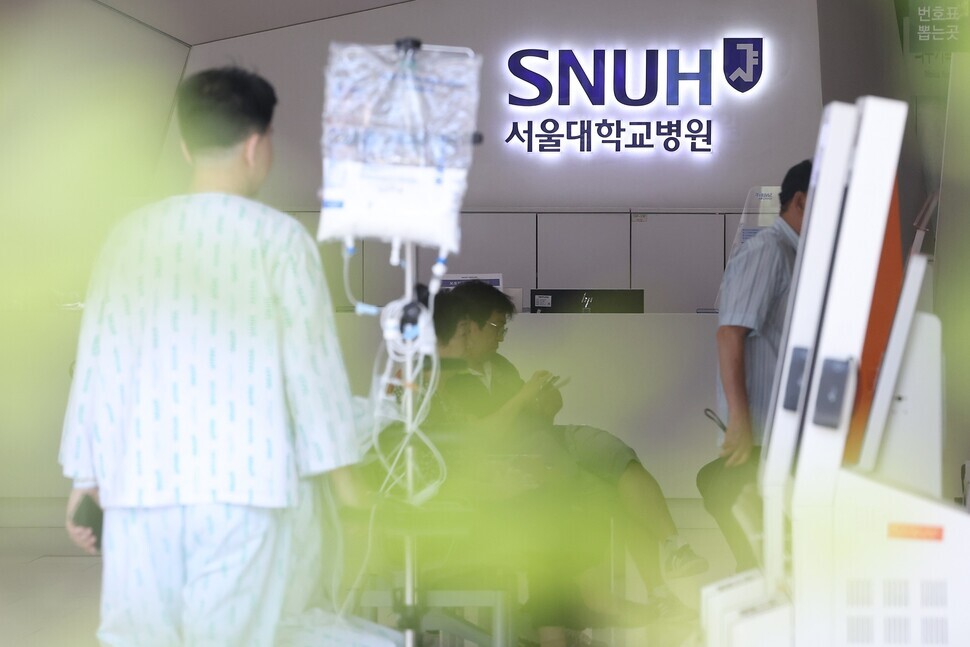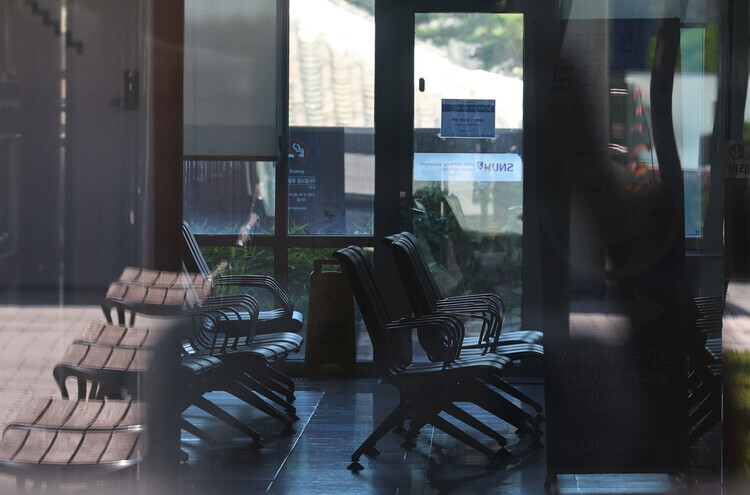hankyoreh
Links to other country sites 다른 나라 사이트 링크
Over 500 teaching physicians halt treatments at SNU hospitals starting Monday

Over 500 physicians appeared poised to take part in a collective walkout at Seoul National University-affiliated hospitals that was scheduled to start Monday.
The number represents over half the faculty in charge of treatment and surgery at the hospitals. The South Korean government has emphasized plans for a forceful response, including the exclusion of hospitals that fail to take action against the boycott from eligibility for support to alleviate financial problems.
Kang Hee-gyung, the chairperson of the emergency committee for the Seoul National University College of Medicine and Seoul National University Hospital faculty association, told the Hankyoreh on Sunday that the coordination of treatment to allow for an indefinite boycott would take place as scheduled starting Monday, adding that the “division of duties for intensive care units and emergency rooms has been completed.”
The emergency committee announced that as of 8 pm on Saturday, 529 professors had postponed their outpatient treatment and regular surgery, procedure, and testing schedules for the first week of the indefinite boycott from June 17 to 22.
The number represents 54.7% of the 967 total faculty members in charge of treatment and surgery at four hospitals: SNU Hospital (in Seoul’s Jongno District), SNUBundang Hospital, Seoul Metropolitan Government-SNU Boramae Medical Center, and SNU Hospital Healthcare System Gangnam Center.
Following the resignation of interns and residents, the average operating room utilization rate has been 62.7%. The emergency committee predicted that the indefinite boycott would bring this percentage down to 33.5%.
At the same time, it noted that while professors have postponed their outpatient treatment and regular surgery duties, they will still be reporting to hospitals to prepare for possible urgent situations in the emergency rooms or intensive care units.
“Professors, who know better than anyone how this may affect prognoses or patients, are adjusting treatment and surgery schedules,” said Oh Seung-won, the public relations manager for the emergency committee.
While opposition lawmakers belonging to the National Assembly Health and Welfare Committee met with Kang and other medical professors from the emergency committee on Sunday, there was no breakthrough on the teaching physicians’ plan to go on an indefinite walkout from patient care.
Kang Sun-woo, a lawmaker with the Democratic Party who met with the professors, shared that the professors’ demands included the cancelation of administrative orders regarding medical interns and residents, the creation of a consultative body for dialogue and discussion, and the discussion of adjustments to medical school admissions quotas with the stakeholders in the medical community.

The Korean Medical Association also put forth three demands of the government on Sunday. The association is demanding that the government revisit its plan to increase medical school admissions quotas, revise its policy package on essential health care, and retroactively cancel its administrative orders regarding medical interns and residents. If the government fails to accept these demands, it says it will go forward with its plan for a general walkout on Tuesday.
The Ministry of Health and Welfare has called it “inappropriate” for the association to predicate whether it will orchestrate a mass walkout on demands it has for the government. The ministry underscored that there has been no change in its plans to increase medical school admissions quotas and to take measures against interns and residents who have left hospitals in protest.
“The administration has previously and on multiple occasions given its word that interns and residents who return to hospitals will not face any disadvantages,” Prime Minister Han Duck-soo said at a government meeting on responses to the collective action by doctors held on Sunday.
“Still, despite much rumination, it is difficult to accept demands that [administrative orders] be made completely null and void,” he went on.
In the event of a mass doctor walkout, the government plans to keep the public informed on what health care facilities are operating at normal capacity via the Ministry of Health and Welfare call center (129) and website.
By Lim Jae-hee, staff reporter; Kim Yoon-ju, staff reporter
Please direct questions or comments to [english@hani.co.kr]

Editorial・opinion
![[Editorial] Exploiting foreign domestic workers won’t solve Korea’s birth rate problem [Editorial] Exploiting foreign domestic workers won’t solve Korea’s birth rate problem](https://flexible.img.hani.co.kr/flexible/normal/500/300/imgdb/original/2024/0626/5517193887628759.jpg) [Editorial] Exploiting foreign domestic workers won’t solve Korea’s birth rate problem
[Editorial] Exploiting foreign domestic workers won’t solve Korea’s birth rate problem![[Column] Kim and Putin’s new world order [Column] Kim and Putin’s new world order](https://flexible.img.hani.co.kr/flexible/normal/500/300/imgdb/original/2024/0625/9617193034806503.jpg) [Column] Kim and Putin’s new world order
[Column] Kim and Putin’s new world order- [Editorial] Workplace hazards can be prevented — why weren’t they this time?
- [Editorial] Seoul failed to use diplomacy with Moscow — now it’s resorting to threats
- [Column] Balloons, drones, wiretapping… Yongsan’s got it all!
- [Editorial] It’s time for us all to rethink our approach to North Korea
- [Column] Why empty gestures matter more than ever
- [Editorial] Seoul’s part in N. Korea, Russia upgrading ties to a ‘strategic partnership’
- [Column] The tragedy of Korea’s perpetually self-sabotaging diplomacy with Japan
- [Column] Moon Jae-in’s defense doublethink
Most viewed articles
- 1Blaze at lithium battery plant in Korea leaves over 20 dead
- 2CIA record confirms US ‘completely destroyed’ Seoul’s Haebangchon in 1950 bombardment
- 3How sanctions are backfiring to fuel a new Eurasian alliance
- 4How 17 km of river could be a fertile bed for NK-China-Russia cooperation
- 5[Column] Kim and Putin’s new world order
- 6Dispatched into unknown danger, foreign day laborers were defenseless against blaze
- 7[Editorial] Workplace hazards can be prevented — why weren’t they this time?
- 8What made Korea’s lithium battery plant fire so deadly
- 9Foreign day laborers make up majority of death toll in Korean battery factory fire
- 10[Editorial] Exploiting foreign domestic workers won’t solve Korea’s birth rate problem